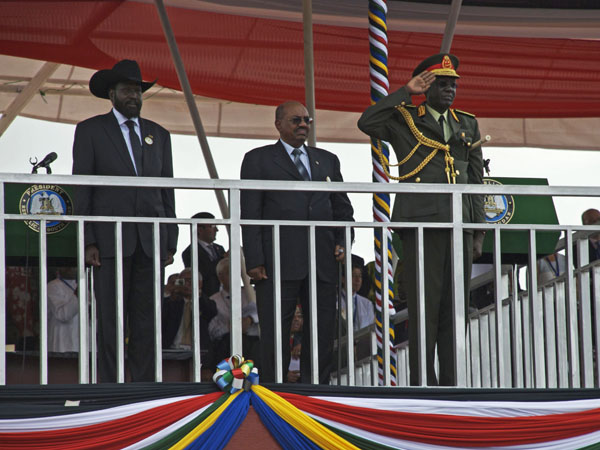
This post originally appeared on Think Progress.
“I’ve got 99 problems but Bashir ain’t one” is emblazoned on t-shirts for sale in the capital of the brand-new country of South Sudan, which officially gained its independence from the North on Saturday.
Even before Sudan gained independence from the United Kingdom and Egypt in 1956, civil war had broken out between the North and South, where rebels rose up to protest the region’s marginalization. Decades and 2 million deaths later, the South is now independent. The weekend was jubilant — from midnight on Friday when crowds filled the streets waving South Sudan flags, through the official declaration ceremony attended by dozens of heads of state and high-level delegations, to the Monday holiday.
“The independence we celebrate today transfers the responsibility for our destinies to our hands,” said newly sworn-in President Salva Kiir, addressing the tens of thousands of people who gathered for the independence ceremony on Saturday. “From today on we will have no excuses or scapegoats to blame.” The president thanked the international community for “addressing the gap” in providing basic services to Southern Sudanese and said that his administration would make public interest its “first, second, and final priorities.”
South Sudan may no longer have to deal with Omar al-Bashir as its leader, but there are many potentially explosive issues that the two countries must continue to work together to sort out, as well as internal issues ranging from the development basics — education, health, infrastructure — to the region’s propensity for conflict. The 99 problems is “just the condensed list,” as one journalist quipped.
Since 2009, a high-level panel convened by the African Union has been facilitating discussion between the North and South governments over big-ticket issues like how to share oil revenue, which is mostly found in the South but must be refined and transported for export through the North. Oil experts estimate that about half of the North’s revenue comes from oil, so finding a compromise is necessary for the viability of the North’s economy, thus regional stability as well. The new international border, 1,200 miles in length, must be demarcated and arrangements made for the communities on either side who are used to being able to travel freely in search of water and pasture. Citizenship more broadly must be settled to ensure that people who have long lived in the other part of what’s now two countries don’t become vulnerable – or at least not more so.
Perhaps most obstinate, an agreement must be made to resolve the dispute over Abyei, which was supposed to have its own referendum to determine whether it would be part of the new state or remain with the North. An interim agreement was forged last month to end the northern army’s occupation of the territory inhabited by people who identify as southerners, but the deal — if it’s implemented — would only re-establish the unsustainable conditions that existed before the army’s invasion and bombardment; a final arrangement remains elusive.
On its own, the South must grapple with a number of deep-seated challenges. At least a dozen militias have emerged over the past year in response to national or local grievances. The southern army has proven incapable of thwarting these threats and has itself committed atrocities against civilians ostensibly in pursuit of the militia fighters.
South Sudan falls along the bottom rung of development metrics as well, leaving the new independent government with an immense amount of work to do to prove that it will not go the way of the previous ruling party and keep resources centralized for the benefit of the citizens in the capital. But when 76 percent of the population cannot read and has little to no formal education, both managing expectations and finding people equipped to roll out public services will be a hurdle for years to come.
The long line of visiting dignitaries who spoke at the independence ceremony on Saturday all pledged their commitment to supporting South Sudan as it finds its footing. For many years, the international community has been moved by the South’s struggle against an oppressive regime, then by the prospect of a peace deal to end Africa’s longest war, and finally in preparation for the emergence of a new country. The task ahead is far more open-ended and as a result may be the most challenging era yet.
Photo: President Bashir and President Kiir inspect the armed forces during a parade on the South's independence day. (Enough/Laura Heaton)

